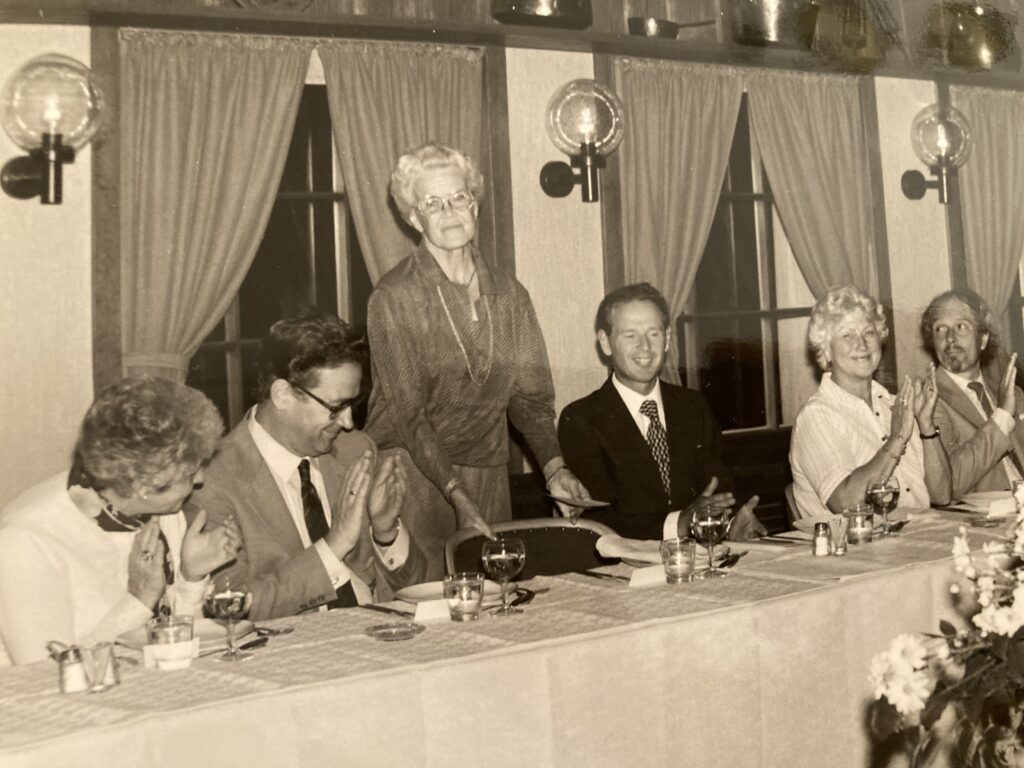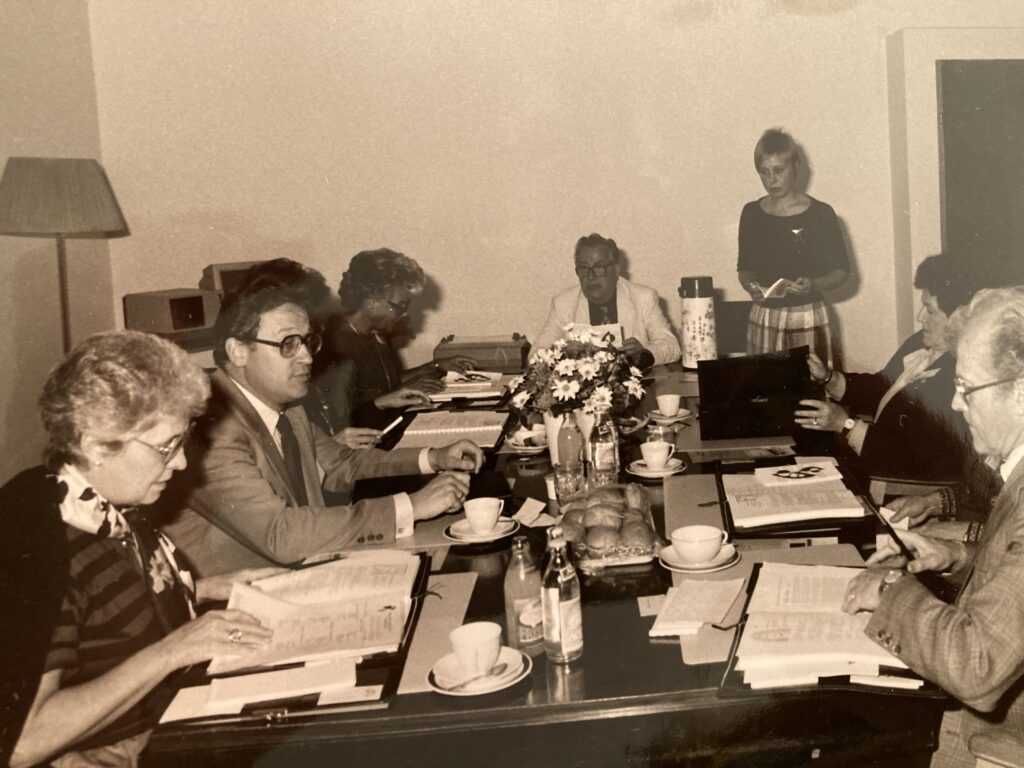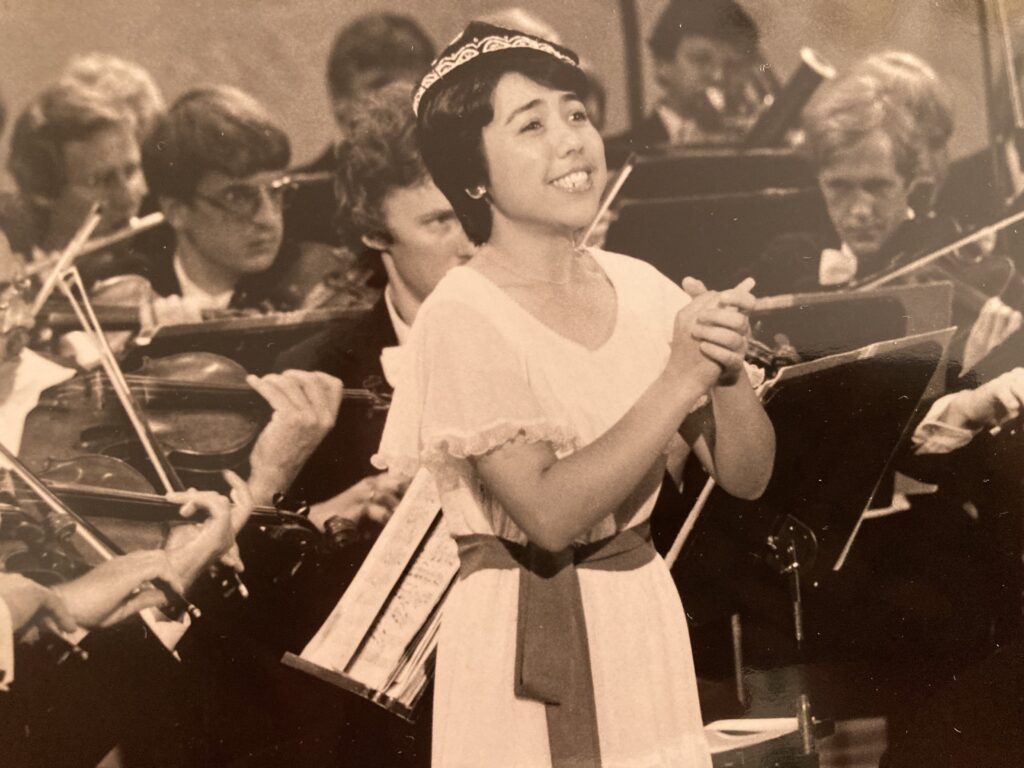40 years of celebrating vocal talent
29 May 2024
The Mirjam Helin International Singing Competition is still fuelled by the spirit and values of its creator, the great singer and pedagogue Mirjam Helin. We met with two people who worked closely with her and saw the launch of the competition, 40 years ago.

The year 2024 marks the 40th anniversary of the Mirjam Helin International Singing Competition, as the competition was held for the first time in August 1984. Much has since changed in the world and in the cultural field, but the core values of the competition remain the same: those of its benefactor and, virtually, creator, Mirjam Helin (1911–2006), Finnish singer and a leading vocal pedagogue of her time. She devoted her career to fostering young singers, having herself refused an operatic career in the 1930s due to opposition from her father and husband.
In 1981, on the eve of her 70th birthday, Mirjam Helin, then a professor at the Sibelius Academy, made a large donation to the Finnish Cultural Foundation, intended for establishing an international singing competition. For many years, she had nurtured a dream of a world-class competition, providing a platform for young singers across the world to show their talent, meet other singers and grow as artists.
Her idea was received with great enthusiasm at the Foundation. Professor Paavo Hohti had recently started as an official at the Finnish Cultural Foundation at the time.
“Mirjam Helin’s proposition was simply magnificent, and a positively transformative event for the Foundation, which until then had concentrated on supporting Finnish art and culture through grants”, says Paavo Hohti. Organising a major cultural event opened up a whole new dimension in the functions of the Foundation. It quickly gave Mirjam Helin an affirmative response and launched the preparations. The Mirjam Helin Singing Competition is still organised by the Finnish Cultural Foundation and financed by the Mirjam and Hans Helin Fund.
A radiating personality
Starting in 1982, the first Competition Secretary was Sirpa Hietanen, then a budding arts producer with a singing background. She joyfully recollects the beginnings of the competition in an atmosphere of great zeal. Mirjam Helin was deeply engaged in the arrangements of the first two editions of the competition, in 1984 and 1989, and was able to see five editions in all before her passing at the age of 95.
Sirpa Hietanen recalls how the competition committee could always rely on Mirjam Helin’s trust and draw inspiration from her presence.
“The commitment of Prof. Helin fuelled the whole team with a huge enthusiasm. We had the feeling of creating something special. But she didn’t want to shine a light on herself; she was very modest. Her passion radiated forth all the same. She was a glowing, warm person who had the ability to be miraculously present in every interaction she had”, Hietanen recalls.
Paavo Hohti remembers how Mirjam Helin didn’t remain a distant patron but instead assumed a place at the Finnish Cultural Foundation and made the officials her family in a way.
“She not only socialised with the upper management but gave her personal attention to everyone, wanting to show her gratitude”, Hohti says. “She was a very special personality who left a strong mark in all our memories.”
Mirjam Helin was childless, and as her estate was assigned to the competition bearing her name, it also became her heir in spirit. During the first two competitions, especially, she listened keenly to every performance, and also embraced the future careers of the prize winners, maintaining correspondence with many of them and travelling to hear them in concert.
”Humane values, familial atmosphere”

For Mirjam Helin, the well-being of the young singers was a priority, and this became the leading thread for the competition, aspiring to create a perfect setting for competitors’ performances: a friendly and welcoming atmosphere with thoughtful arrangements of the highest quality. When the mundane details are running smoothly, singers can concentrate on that which matters most: the music.
“The competition is built in every way on the legacy of Mirjam Helin and her humane values”, says Sirpa Hietanen. “For example, the eliminated competitors, too, have the opportunity to meet the members of the jury face-to-face. For many, encouragement of this kind has been very meaningful. This is essentially the spirit of Mirjam Helin: allowing aspiring singers to do their best and supporting them on their professional path.”
Home accommodation was part of the competition from the very start, providing the contestants with a family-like setting. According to Sirpa Hietanen, this created a warmly familial atmosphere around the whole event, as elderly ladies took singers under their wings and made friends with them.
“Year after year, the competitors have been praising the encouragement and support they received from their ‘families’ and the Finnish audience.”
More than just competing
Although a musical competition was Mirjam Helin’s life-long dream, the competitive element was not the main thing for her. Helin’s ideas of providing professional communality and international relations for singers left a strong impression on Paavo Hohti.
“Of course she took delight in the performances and was happy for the winners, but her idea of a singing competition was far more than just selecting the best. She strongly believed that seeing and hearing others is vital for a singer’s development, and she wanted everyone to feel appreciated.”
This ideal most clearly materialised in the form of masterclasses held by the members of the jury, an important feature in the Mirjam Helin Singing Competition for years, but also in the way the competition encourages and creates collegiality among the competitors instead of competitiveness.
“Her approach valued the personality of each singer”, Hohti says. “Opera directors were not included in the jury so that singing itself would be the priority, not professional suitability.”
Legendary figures

Creating an international cultural event in the early 1980s was something radically different from today. Sirpa Hietanen reminisces about the bustle at the competition office at a time when English was not at all the foremost language of international communication. French, German and Russian were used instead, and musicians and volunteers with a wide range of language skills were selected to work at the office.
Hietanen was responsible for communications before and during the whole competition. “Telefax was an innovation back then! We held press conferences, sent letters, and talked face to face with journalists. It was such a different time! And it was so exciting to have international visitors in Helsinki; that was still a novelty.”
She especially remembers a moment in 1984 when she stood welcoming a group of Chinese singers who had travelled across Russia by train. Two weeks later, three of them were among the prize winners, including the Uyghur coloratura soprano Dilbèr, who proceeded to make a career in the West and performed a lot in Finland.
Unlike any others were the moments Sirpa Hietanen spent with the jury, acting as its secretary during the competitions of 1984 and 1989. Apart from the actual work, she also accompanied the jurors on trips in Helsinki and its surroundings, getting to know legendary figures such as Birgit Nilsson, Jevgeni Nesterenko, and Kim Borg.
“It was amazing to spend two weeks with such a cast of international star singers and grand personalities”, she exclaims. “Watching them work taught me a tremendous amount about singing, and the stories they told were unforgettable.”
Auli Särkiö-Pitkänen
